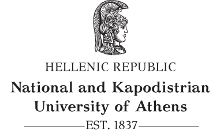EVENTS
GUEST LECTURE: SOVEREIGNTY, OCCUPATION AND RESISTANCE: GREECE 1941-1944

On Wednesday 30 November Dr. Kostis Karpozilos, director of the Contemporary Social History Archives (ASKI- Athens, Greece) gave a guest lecture to the students with the title: “Sovereignty, Occupation and Resistance: Greece 1941-1944”. The guest lecture was organized on the framework of the course “STATE-BUILDING IN SOUTHEASTERN EUROPE AND THE INTERNATIONAL ORDER: THE 19TH AND 20TH CENTURIES” taught by Assistant Professor Zinovia (Jenny) Lialiouti.
Kostis Karpozilos is the director of the Contemporary Social History Archives (ASKI- Athens, Greece). His forthcoming book [“Out of Bounds: ATransnational History of Greek Communism”] addresses the interplay of diasporic communities, transnational networks and experiences of displacement in the development of the Greek communist movement. He is the author of Red America: Greek Communists in the United States, 1920-1950 [Crete University Press, 2017; Berghahn Books, in press] and (co-authored with Dimitris Christopoulos) 10+1 Questions and Answers on the Macedonian Question, Rosa Luxemburg Stiftung, 2018. Kostis was a postdoctoral fellow at Columbia University, Princeton University and Oxford University. He currently teaches at Panteion University in Athens
Abstract
In 1941 Greece was occupied by the Axis powers. This development led to the fragmentation of the Greek State in three zones of control and the gradual evolution of competing powers claiming to represent national sovereignty. We will discuss these parallel transformations focusing on the interplay between the spatial breakdown of the Greek State, the hybrid geographies of wartime and the dynamics surrounding the idea of national sovereignty. This will allow us to address the power-struggle between the collaborationist government, the government-in-exile, and the hybrid government of the armed resistance that defined the transition from wartime antifascist unity to the Cold War division.
